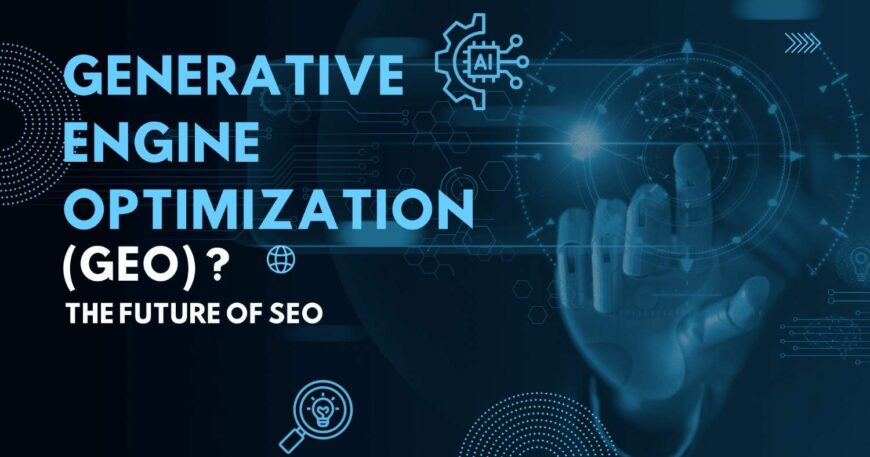Introduction
In the rapidly evolving digital landscape of 2025, traditional Search Engine Optimization (SEO) is no longer sufficient to ensure online visibility. With the rise of AI-driven search engines like ChatGPT, Google Gemini, and Perplexity, a new strategy has emerged: Generative Engine Optimization (GEO). This approach focuses on optimizing content to be more discoverable and authoritative within AI-generated responses, marking a significant shift from keyword-centric SEO practices.
What Is Generative Engine Optimization (GEO)?
Generative Engine Optimization (GEO) is the practice of structuring and enhancing digital content to increase its likelihood of being cited or referenced by large language models (LLMs) and AI-driven search engines. Unlike traditional SEO, which aims to rank content on search engine results pages (SERPs), GEO focuses on optimizing content for visibility within AI-generated answers and overviews. This strategy is becoming increasingly crucial as AI tools become primary sources of information for users.
How GEO Differs from Traditional SEO:
While both GEO and SEO aim to increase online visibility, they differ in their approaches and objectives:
SEO (Search Engine Optimization): Focuses on optimizing content to rank higher on traditional search engines like Google and Bing. This involves keyword optimization, backlink building, and improving user experience to drive organic traffic.
GEO (Generative Engine Optimization): Centers on structuring content to be easily understood and cited by AI systems. This includes using clear headings, concise information, and authoritative sources to ensure AI models can effectively extract and present your content.

The primary distinction lies in the target audience: SEO caters to human users, while GEO caters to AI algorithms that generate responses for users.
Why Generative Engine Optimization Matters in 2025:
The increasing reliance on AI for information retrieval has transformed how users access content online. Studies indicate that a significant portion of online searches now result in AI-generated responses, reducing the need for users to click through to individual websites. This shift underscores the importance of GEO in digital marketing strategies. By optimizing content for AI systems, businesses can ensure their information is included in AI-generated answers, maintaining visibility and authority in an AI-dominated search landscape.
Key Strategies for Implementing GEO
To effectively implement GEO, consider the following strategies:
Structure Content for AI Readability: Organize your content using clear headings, bullet points, and concise paragraphs. This structure aids AI systems in quickly identifying and extracting relevant information.
Use Authoritative and Citable Sources: Incorporate reputable sources and data into your content. AI models prioritize information from authoritative sources, increasing the likelihood of your content being cited.
Optimize for Conversational Queries: Anticipate the types of questions users might ask and structure your content to provide direct answers. This approach aligns with the conversational nature of AI-generated responses.
Monitor AI Mentions: Utilize tools to track how often your content is referenced by AI systems. This monitoring can provide insights into the effectiveness of your GEO strategies and areas for improvement.
Benefits of GEO
for Businesses Implementing GEO can lead to several benefits for businesses:
Increased Visibility: Enhanced presence in AI-generated responses leads to greater brand exposure.
Improved Authority: Being cited by AI systems positions your brand as a trusted source of information.
Higher Engagement: AI-generated answers often include links to original sources, driving traffic to your website.
These advantages highlight the importance of integrating GEO into your digital marketing strategy to stay competitive in an AI-driven online environment.
Challenges in Adopting GEO
While GEO offers numerous benefits, businesses may encounter challenges in its adoption:
Understanding AI Algorithms: AI systems are complex and continuously evolving, making it challenging to predict how content will be interpreted and cited.
Resource Allocation: Implementing GEO requires time and resources to restructure existing content and develop new materials tailored for AI systems.
Monitoring and Adaptation: Continuous monitoring of AI mentions and adapting strategies accordingly can be resource-intensive.
Despite these challenges, the potential benefits of GEO make it a worthwhile investment for businesses aiming to maintain visibility in the AI-driven digital landscape.
Looking Ahead: The Future of GEO
As AI technology continues to advance, the role of GEO in digital marketing will become increasingly significant. Businesses that adapt to this shift by optimizing their content for AI systems will be better positioned to maintain visibility and authority in search results. Staying informed about developments in AI and continuously refining your GEO strategies will be crucial for long-term success in the evolving digital landscape.
Frequently Asked Questions (FAQs)
Q1: How does GEO impact my website's SEO rankings?
While GEO focuses on AI-generated responses, it complements traditional SEO by enhancing your content’s visibility across different platforms, potentially leading to increased traffic and improved SEO rankings.
Q2: Can Generative Engine Optimization (geo) be implemented without overhauling existing content?
Yes, GEO can be integrated by making strategic adjustments to existing content, such as adding clear headings, incorporating authoritative sources, and structuring information for AI readability.
Q3: Are there tools available to assist with GEO implementation?
Yes, GEO can be integrated by making strategic adjustments to existing content, such as adding clear headings, incorporating authoritative sources, and structuring information for AI readability.
Q4: How can I measure the success of my GEO efforts?
Success can be measured by tracking metrics such as the frequency of AI mentions, changes in website traffic, and improvements in brand authority as reflected in AI-generated responses.
Conclusion
Generative Engine Optimization (GEO) represents a significant shift in digital marketing strategies, focusing on enhancing content visibility within AI-generated responses. By understanding and implementing GEO, businesses can ensure their information is accurately represented and easily accessible to users through AI platforms. As AI continues to shape the digital landscape, adopting GEO will be essential for maintaining and enhancing online visibility.



